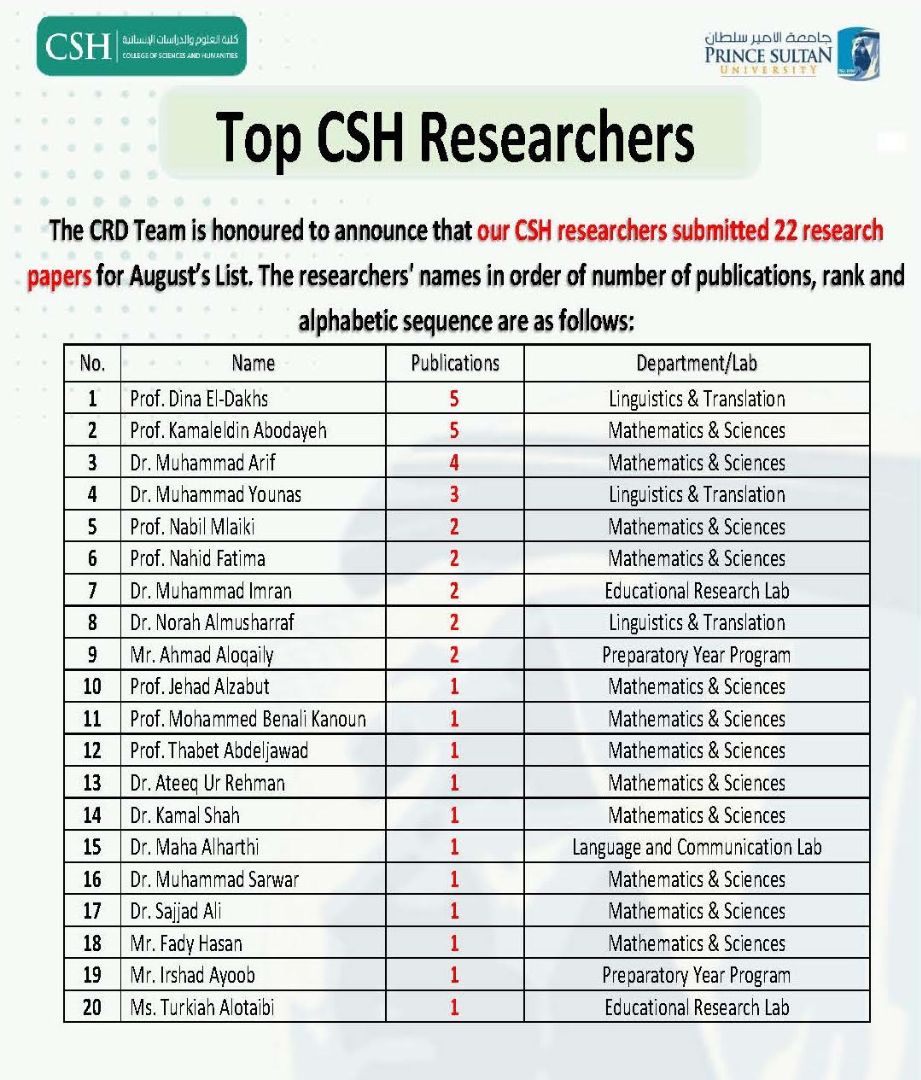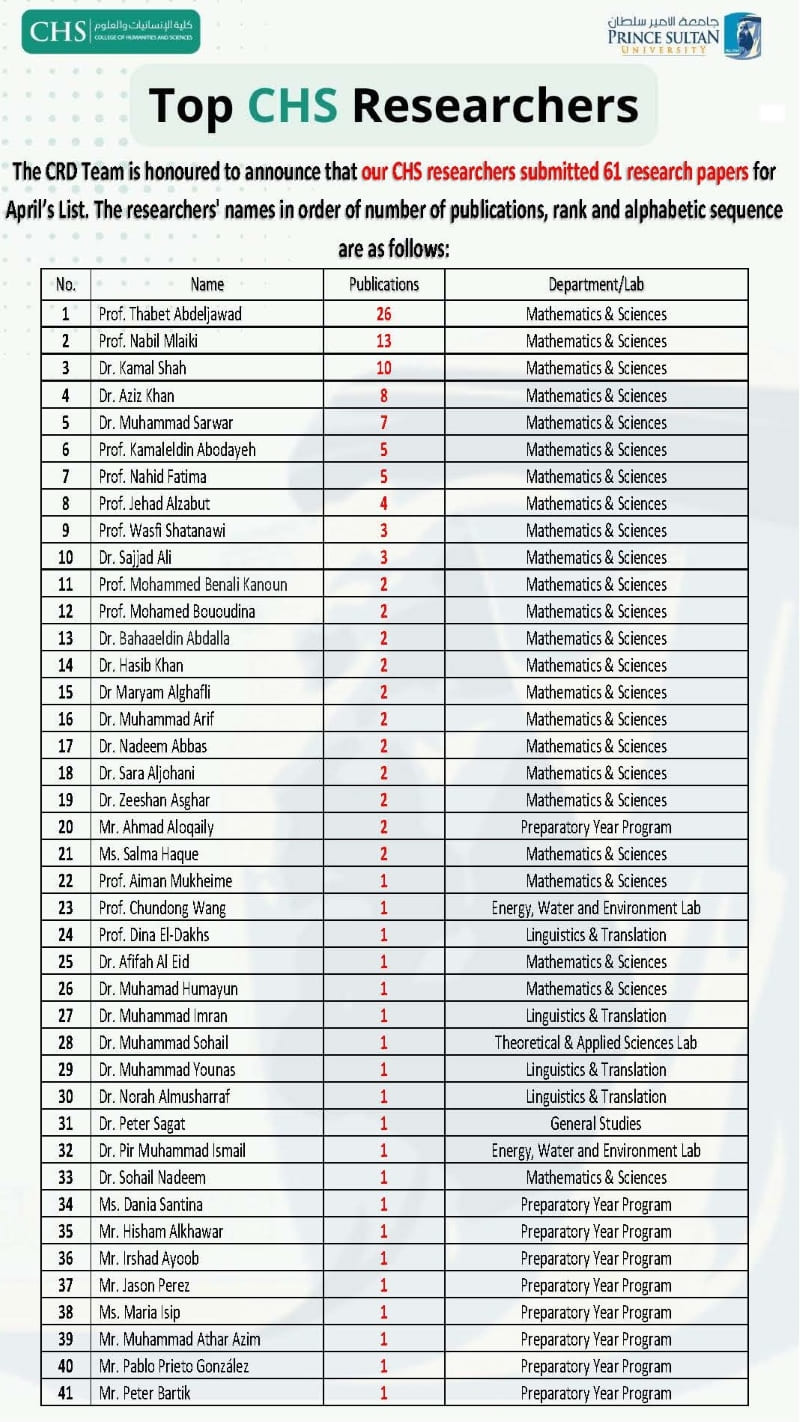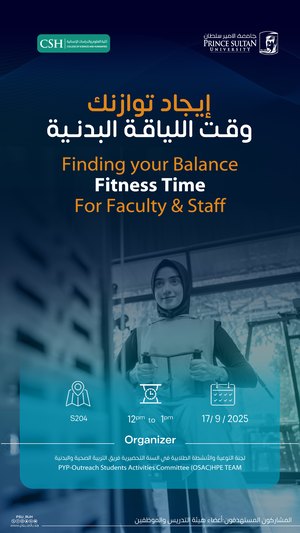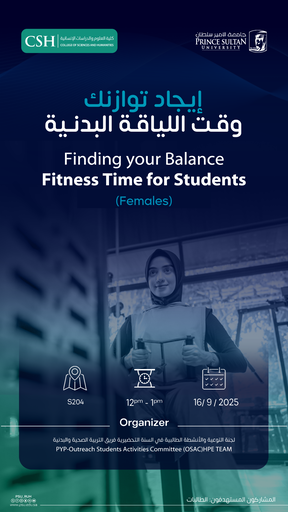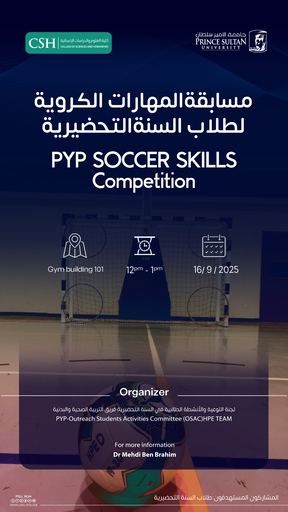SDG 7: Affordable and Clean Energy
SDG 7, an integral component of the United Nations' Sustainable Development Agenda, stands as a guiding beacon in Prince Sultan University (PSU) collective mission to ensure equitable access to affordable, reliable, sustainable, and modern energy for all. As a dedicated institution that nurtures innovation and progress, PSU acknowledges the crucial significance of sustainable energy in shaping the future. PSU's commitment to this goal aligns with our dedication to empowering not only our students but also the broader community with the knowledge and tools needed to navigate the complexities of energy sustainability. PSU is committed to SDG 7, actively participating in sustainable energy projects and educational programs that contribute to a greener and more accessible energy future.
Energy-efficient renovation and building Have a policy in place for ensuring all renovations or new builds are following energy efficiency standards
Prince Sultan University (PSU) is committed to energy efficiency in all renovation and construction projects, reflecting its sustainable development goals as part of its broader environmental policy framework. Through its Sustainable Waste Management, Prevention, and Disposal Policy, PSU prioritizes energy-efficient practices that align with sustainable building standards. This policy, implemented by the PSU Maintenance Department, mandates the reduction of energy-intensive waste, supports infrastructure optimized for low-carbon emissions, and advocates for minimizing the use of carbon-heavy processes. Regular performance monitoring, reporting, and compliance checks ensure that PSU’s energy-efficient practices are effectively integrated into campus renovations and new builds, contributing to a greener campus environment.
Read PolicyUpgrade buildings to higher energy efficiency.
Have plans to upgrade existing buildings to higher energy efficiency
HAALA Energy launched the Solar PV Project at PSU, with the overarching goal of upgrading university buildings for higher energy efficiency. This initiative integrates solar photovoltaic (PV) systems, detailed energy audits, and advanced energy-efficient technologies like LED lighting, enhanced insulation, and optimized HVAC systems. By targeting substantial reductions in energy consumption and carbon emissions, the project aligns PSU with international sustainability objectives, providing long-term economic savings and setting a standard for similar efforts globally. In their feasibility assessment, HAALA Energy explored multiple installation sites, including rooftops on Buildings 1 to 5 and various campus parking areas, ultimately selecting solar carports as the most effective option. These carports capture abundant sunlight while offering low installation and maintenance costs, embodying HAALA’s commitment to sustainable, forward-thinking energy solutions. This project underscores PSU’s commitment to environmental sustainability and campus-wide energy efficiency upgrades.
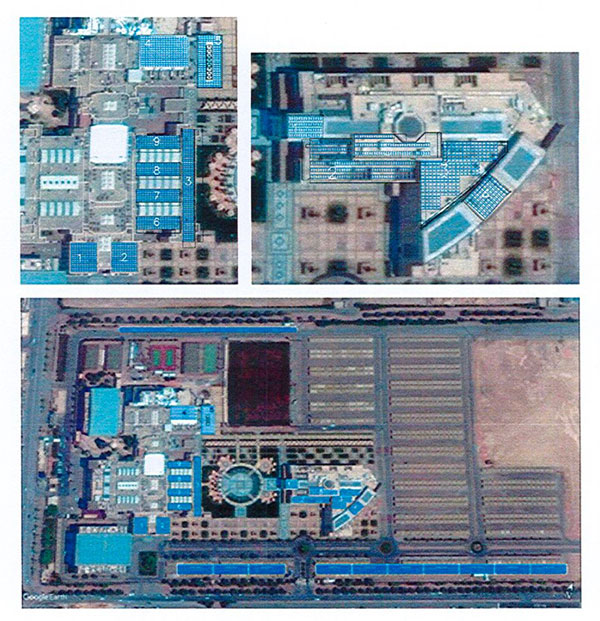
Plan for Upgrade Building.
Carbon reduction and emission reduction process
Have a process for carbon management and reducing carbon dioxide emissions
Prince Sultan University (PSU) has adopted a comprehensive process for carbon management and emission reduction, closely aligned with Saudi Vision 2030 and the global drive towards sustainability. Through the Zero Waste Initiative, supported by partnerships with PepsiCo’s pep+ framework and the Center for Sustainability and Climate, PSU emphasizes reducing waste and promoting a circular economy as key strategies to lower greenhouse gas emissions. The initiative encourages students to ideate, design, and implement projects focused on responsible consumption, recycling, and sustainable design, all aimed at minimizing waste and reusing resources. By fostering awareness, supporting innovative waste reduction projects, and aligning with Sustainable Development Goal 7 on Affordable and Clean Energy, PSU not only mitigates carbon emissions but also promotes sustainable energy practices across campus. This commitment to carbon reduction and waste management is a testament to PSU’s dedication to a sustainable and environmentally friendly future. Also, Prince Sultan University (PSU) has implemented a robust carbon management and emission reduction process, encapsulated within its Sustainable Waste Management, Prevention, and Disposal Policy. This policy, approved by the University Council, highlights PSU's commitment to building a sustainable, green campus. Key initiatives include minimizing plastic use, reducing dependency on disposable items, adopting energy-efficient practices, and avoiding carbon-intensive industries. The Maintenance Department oversees waste management, employing a prevention approach to minimize carbon emissions and coordinating with municipal and specialized agencies to dispose of various waste types responsibly. By regularly monitoring landfill and recycled waste and reporting performance metrics, PSU not only mitigates carbon emissions but also fosters a healthier, eco-friendly campus environment, demonstrating a strong commitment to sustainability aligned with global standards.
See InitiativesPlan to reduce energy consumption.
Prince Sultan University (PSU) has implemented a comprehensive energy efficiency plan to reduce overall energy consumption and promote a sustainable campus. The university focuses on creating an eco-friendly environment by enhancing infrastructure and optimizing resource use.
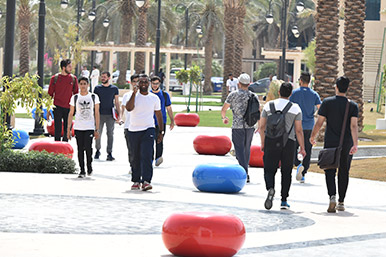
Digital transformation initiatives further minimize reliance on physical resources, increasing operational efficiency and reducing energy usage. PSU also fosters a culture of sustainability through wellness programs that encourage energy-saving practices. Key measures include installing solar panels, using inverter-based air conditioning systems, advocating for LED lighting, implementing solar water heaters, and integrating motion sensors and dimmer controls. These initiatives aim to reduce energy consumption by 5-10%, highlighting PSU's commitment to environmental stewardship and organizational excellence.
Digital transformation initiatives further minimize reliance on physical resources, increasing operational efficiency and reducing energy usage. PSU also fosters a culture of sustainability through wellness programs that encourage energy-saving practices. Key measures include installing solar panels, using inverter-based air conditioning systems, advocating for LED lighting, implementing solar water heaters, and integrating motion sensors and dimmer controls. These initiatives aim to reduce energy consumption by 5-10%, highlighting PSU's commitment to environmental stewardship and organizational excellence.
Energy wastage identification.
Prince Sultan University (PSU) is committed to sustainability through proactive energy management and waste reduction. The university conducts comprehensive energy reviews of its facilities, including buildings 101 and 104, to identify areas of significant energy wastage and implement targeted improvements.

This initiative aims to enhance operational efficiency while promoting cost-effective and eco-friendly practices. The Maintenance Department oversees these evaluations to ensure compliance with energy efficiency standards and to foster responsible energy usage. Additionally, PSU has established a Sustainable Waste Management, Prevention, and Disposal Policy that focuses on minimizing waste, utilizing appropriate disposal channels, and reinforcing its commitment to creating a greener campus. Together, these efforts demonstrate PSU's dedication to optimizing energy resources and promoting sustainability throughout the university.
Read PolicyHave a policy on divesting investments from carbon-intensive energy industries notably coal and oil
Prince Sultan University (PSU) has established a Sustainable Investment Policy (SIP) (https://www.psu.edu.sa/en/GV00019-sustainable-investment-policy ) that emphasizes the university's commitment to responsible investment practices. As part of this policy, PSU divests from carbon-intensive energy industries, particularly coal and oil, aligning its financial strategies with the principles of environmental, social, and corporate governance (ESG). The SIP promotes investments in companies that demonstrate sustainable practices and supports the UN Sustainable Development Goals (SDGs). By excluding investments in extractive fossil fuels and employing both negative and positive screening methods, PSU aims to enhance long-term financial returns while minimizing risks associated with environmentally harmful sectors. This proactive approach reflects PSU's dedication to fostering a sustainable future and responsible stewardship of its investment portfolio. Prince Sultan University (PSU) has established a Sustainable Financial Revenue Diversification Policy (https://www.psu.edu.sa/en/GV00010-sustainable-financial-revenue-diversification-policy ) that includes a commitment to divesting from carbon-intensive energy industries, particularly coal and oil. This policy aims to secure sustainable financial resources and supports innovation and commercialization of research while aligning with responsible investment practices and broader environmental goals.
Energy use density
Prince Sultan University (PSU) demonstrates its commitment to sustainable energy practices through its energy consumption policy, which emphasizes divesting from carbon-intensive energy industries, particularly coal and oil. The university has an energy use density of 173 kWh per square meter per year, leading to a total annual energy consumption of 15.9 GWh across its 92,016 square meters of floor space. This consumption varies among its buildings: B101, the largest contributor, consumes approximately 7.79 GWh, followed by B105 at 3.44 GWh. Other buildings, including B102, B104, and B106, consume about 1.28 GWh, 1.6 GWh, and 1.08 GWh, respectively, while B103 has the lowest at 0.72 GWh. These figures underscore the importance of tailored energy-saving plans, particularly for B101 and B105, to enhance overall energy efficiency and reduce PSU's carbon footprint. By adopting responsible investment strategies and optimizing energy use, PSU aligns its efforts with global sustainability goals, fostering a more sustainable future.
Local community outreach for energy efficiency
Provide programmes for local community to learn about importance of energy efficiency and clean energy
Prince Sultan University's College of Engineering held a three-day Hands-on Solar PV Installation Training workshop from October 13-15, 2024, as part of its commitment to Sustainable Development Goal 7 (SDG 7) and promoting renewable energy solutions. The workshop offered participants practical experience in installing and operating solar photovoltaic (PV) systems. Activities included connecting solar cells, using MC4 connectors, and setting up inverters, charge controllers, and off-grid battery systems. With 26 attendees, the workshop provided a robust, hands-on learning environment, enabling participants to gain confidence in solar energy applications and contribute to advancing sustainable energy initiatives.
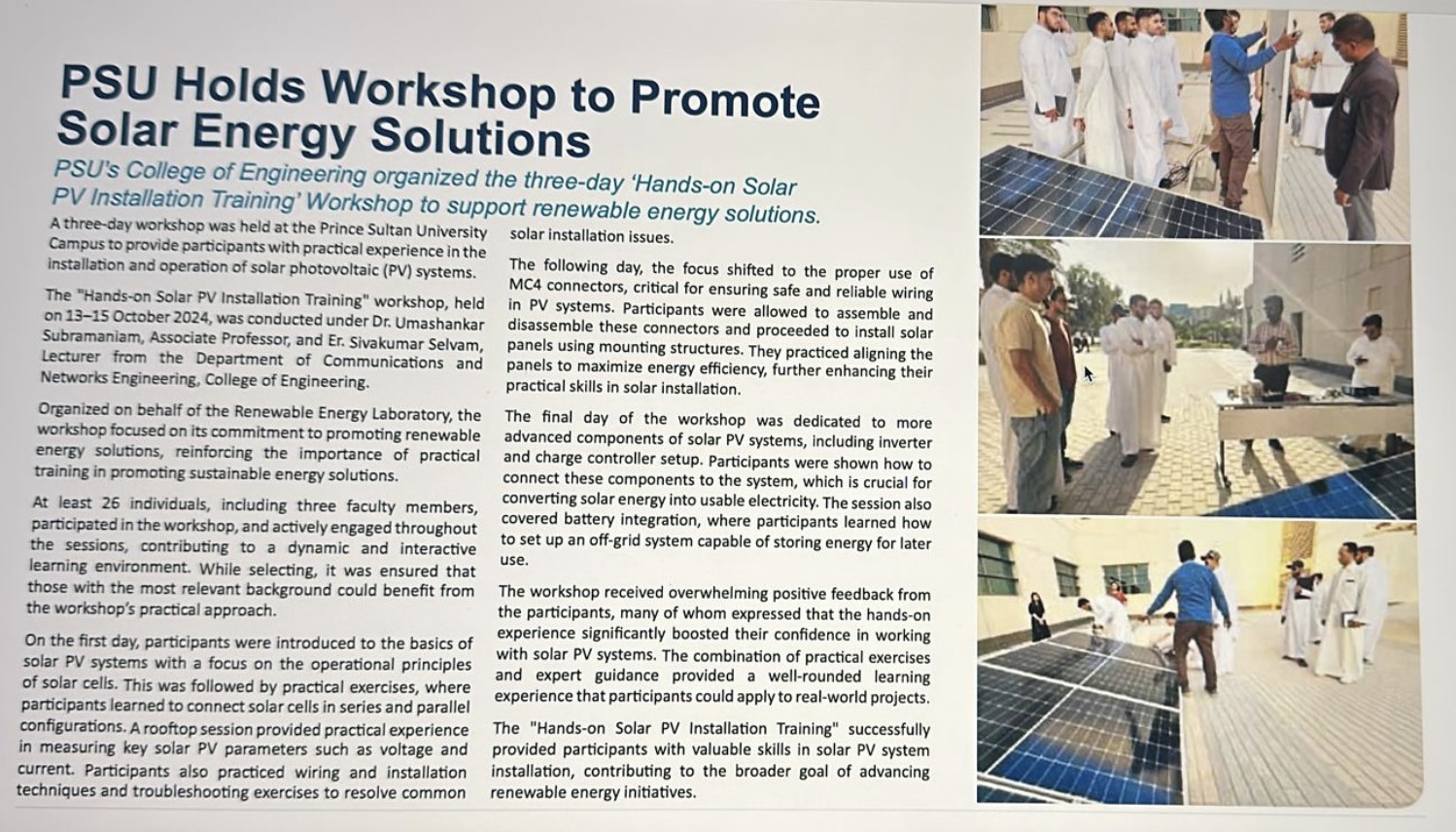
Prince Sultan University (PSU) is actively engaged in local community outreach to promote energy efficiency and clean energy practices. The Renewable Energy Lab (REL) has made significant strides in this area, exemplified by recent open-access publications that contribute to sustainable development. One impactful article focuses on “Analysis of solution strategies for the transition to renewable energy in Saudi Arabia,” directly addressing the UN Sustainable Development Goals, particularly SDG 7 (Affordable and Clean Energy). Through these initiatives, PSU emphasizes the importance of educating the local community on energy efficiency and sustainable practices, reinforcing its commitment to fostering a more sustainable future and addressing global challenges through research and collaboration.
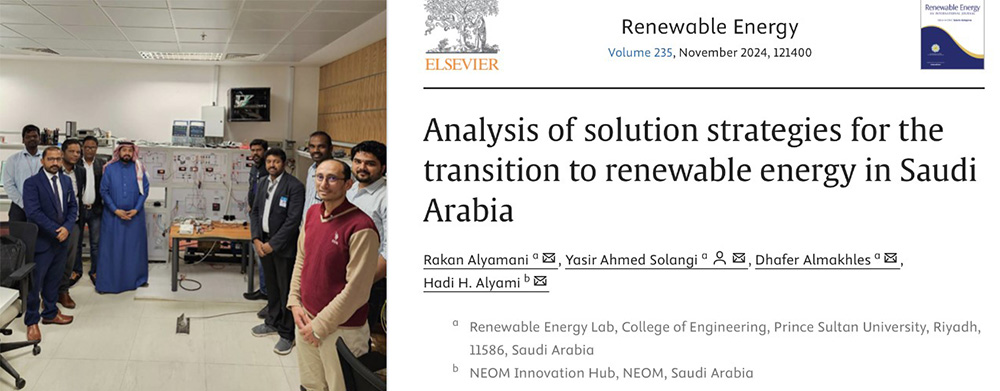
As part of its commitment to Sustainable Development Goal 7 (SDG 7) on affordable and clean energy, Prince Sultan University organized a series of specialized sessions at leading international conferences in 2024. At IECON 2024, the session titled DC-DC Power Conversion: Innovations in Topologies, Control Strategies, and Diverse Applicationsshowcased cutting-edge developments in power conversion technologies essential for clean energy systems.
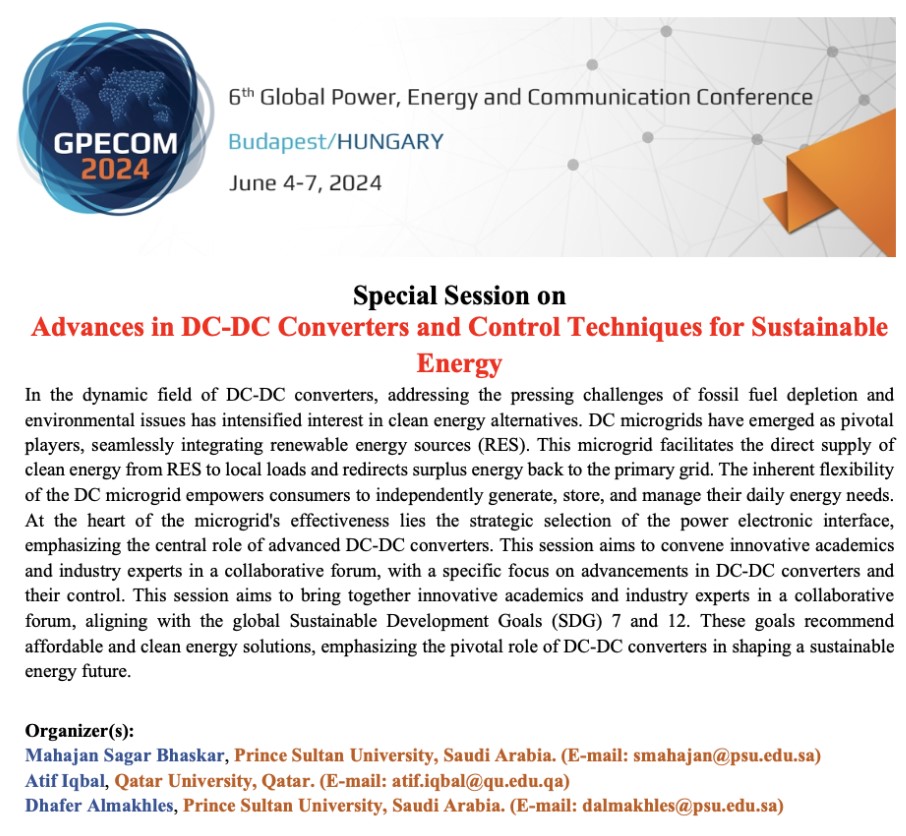
Further emphasizing sustainable energy advancements, PSU presented Advances in DC-DC Converters and Control Techniques for Sustainable Energy at IEEE GPECOM 2024, addressing innovations that enhance the efficiency and performance of energy conversion processes. Lastly, PSU’s participation in SEPC 2024 with Advancements in Power Conversion - Techniques and Applications focused on transformative power conversion methods, underscoring PSU’s dedication to sustainable energy solutions that align with SDG 7 goals.
Conferences:
Prince Sultan University (PSU) is dedicated to local community outreach aimed at enhancing energy efficiency and promoting clean energy practices. As part of this commitment, the Engineering College organizes events such as the 2nd International Conference on Sustainability: Development and Innovations (ICSDI 2024). This dynamic conference serves as a platform to connect diverse talents with decision-makers and explore innovative solutions aligned with sustainable development goals (SDGs). Through a variety of presentations, workshops, and expert panels, the conference addresses pressing sustainability challenges and emphasizes the importance of energy efficiency. These programs provide valuable opportunities for the local community to learn about sustainable practices, fostering a collective commitment to a greener future.
The International Conference on Sustainability Developments and Innovations (ICSDI 2024)
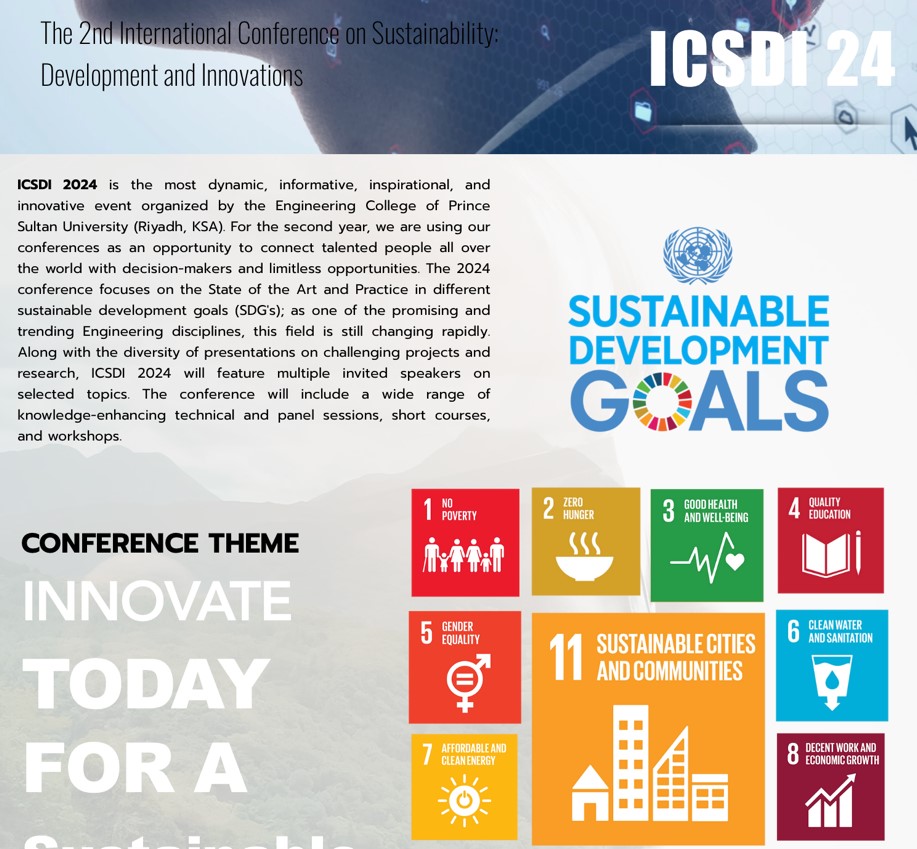
Prince Sultan University (PSU) is dedicated to local community outreach aimed at enhancing energy efficiency and promoting clean energy practices. As part of this commitment, the Engineering College organizes events such as the 2nd International Conference on Sustainability: Development and Innovations (ICSDI 2024). This dynamic conference serves as a platform to connect diverse talents with decision-makers and explore innovative solutions aligned with sustainable development goals (SDGs). Through a variety of presentations, workshops, and expert panels, the conference addresses pressing sustainability challenges and emphasizes the importance of energy efficiency. These programs provide valuable opportunities for the local community to learn about sustainable practices, fostering a collective commitment to a greener future.
Visit website100% renewable energy pledge
Promote a public pledge toward 100% renewable energy beyond the university
Prince Sultan University (PSU) has taken a significant step toward environmental sustainability by pledging to achieve net zero carbon emissions by 2060, making it the first university in Saudi Arabia to commit to this ambitious goal. As an official signatory of the Race to Zero campaign, PSU joins a global coalition advocating for a healthy, resilient recovery that emphasizes the transition to 100% renewable energy.
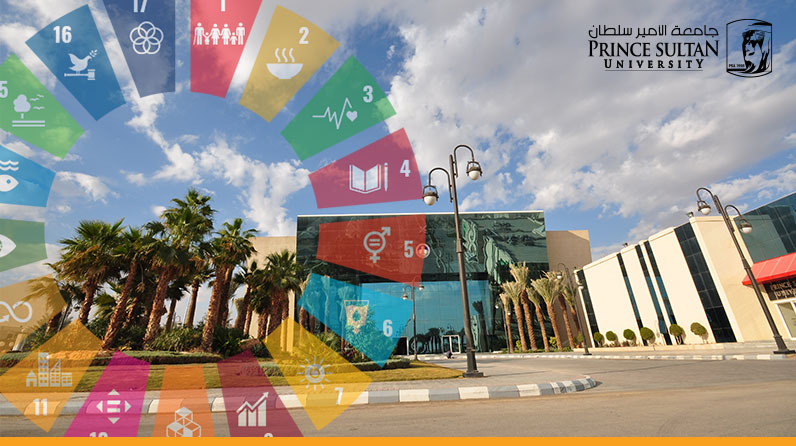
This initiative not only highlights PSU's commitment to sustainable practices within the university but also encourages broader community engagement in promoting renewable energy solutions beyond its campus. By participating in this movement, PSU aims to inspire other institutions and individuals to adopt similar pledges, contributing to a collective effort to combat climate change and support global sustainability goals. PSU is taking a significant step by committing to 100% renewable energy, aligning with global sustainability efforts. PSU's initiative not only sets an example but also contributes to a cleaner, more sustainable future. While PSU's commitment is vital on campus, its impact reaches beyond, serving as a model for others to embrace renewable energy and sustainability. This pledge is not just a reflection of PSU's responsibility but also an inspiration for a cleaner, greener world.
Read Full StoryEnergy efficiency services for industry
Provide direct services to local industry aimed at improving energy efficiency and clean energy (energy efficiency assessments, workshops, research renewable energy options)
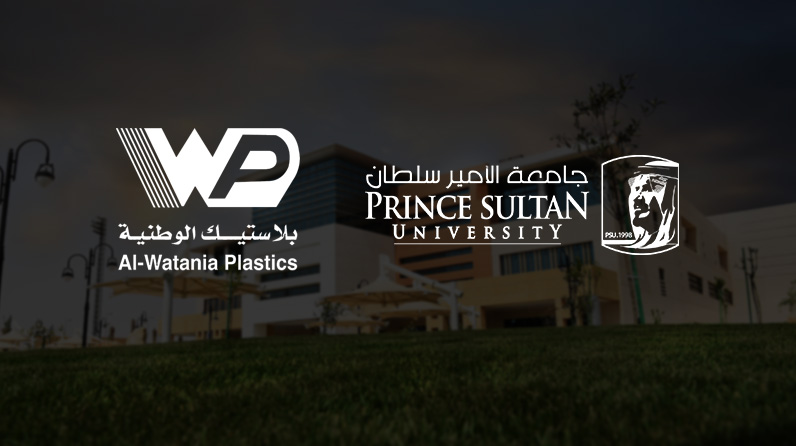
In Dec. 2022, PSU took significant strides in fostering energy efficiency within the local industrial sector. PSU, in collaboration with Al Watania and the Center for Community Service and Continuing Education, actively participated in the annual ceremony of the Ambition Elite program, organized by the General Authority for Small and Medium Enterprises. This event showcased PSU's and Al Watania's commitment to supporting, developing, and nurturing small and medium enterprises in the Kingdom of Saudi Arabia. PSU's role in the event emphasized the importance of energy efficiency in the industrial sector, offering direct services such as energy efficiency assessments, workshops, and research into renewable energy options. These initiatives underline PSU's and Al Watania's dedication to enhancing energy efficiency and promoting clean energy practices within local industries, aligning with broader sustainability goals and contributing to a more environmentally responsible and economically efficient future.
Read Full Story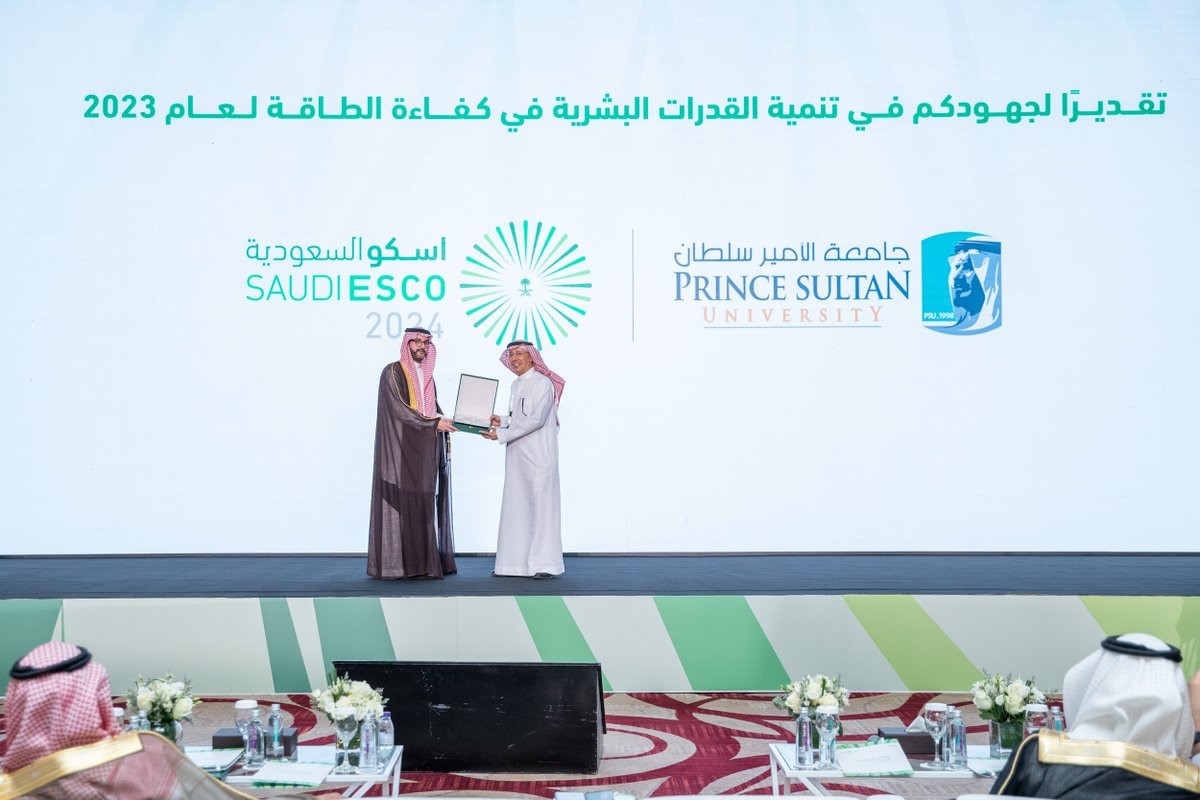
Prince Sultan University (PSU), represented by its College of Engineering, has been honored by the Saudi Energy Efficiency Center for its impactful contributions to energy efficiency services for local industry. Through targeted initiatives, PSU is enhancing industry capabilities by providing energy efficiency assessments, organizing specialized workshops, and conducting research into renewable energy options. These efforts were recognized during the ESCOSaudi 2024 Forum, reflecting PSU’s commitment to fostering clean energy solutions and supporting the Kingdom’s energy efficiency objectives. By focusing on capacity building and industry collaboration, PSU plays a key role in advancing sustainable energy practices in Saudi Arabia.
Policy development for clean energy technology
Inform and support governments in clean energy and energy-efficient technology policy development
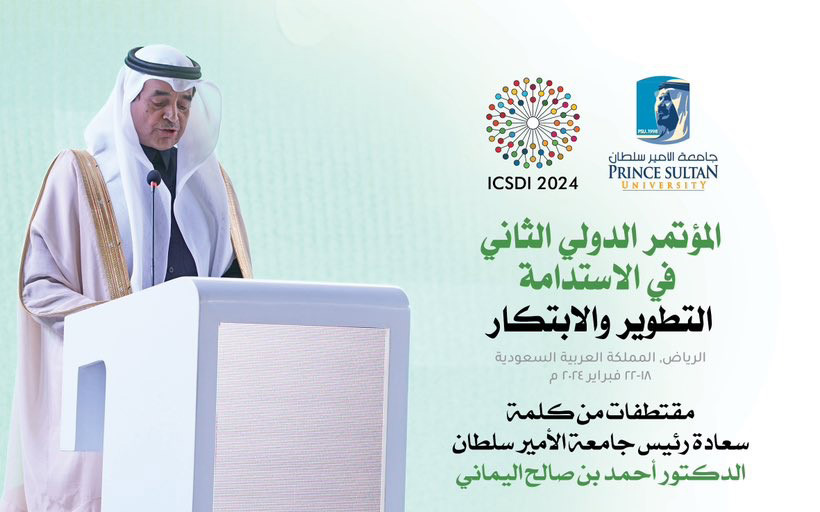
Prince Sultan University (PSU) actively engages in policy development for clean energy technologies, providing vital guidance to governmental bodies. Dr. Ahmed Al-Yamani, President of PSU, highlighted the university's dedication to advancing clean energy initiatives by informing policy and supporting energy-efficient technology advancements. PSU's expertise aids in the development of policies that promote sustainable energy practices, reinforcing the university’s commitment to driving forward Saudi Arabia’s clean energy goals. Through collaborative research and strategic recommendations, PSU plays a pivotal role in shaping the national clean energy sector.
Assistance to low-carbon innovation
Provide assistance for start-ups that foster and support a low-carbon economy or technology
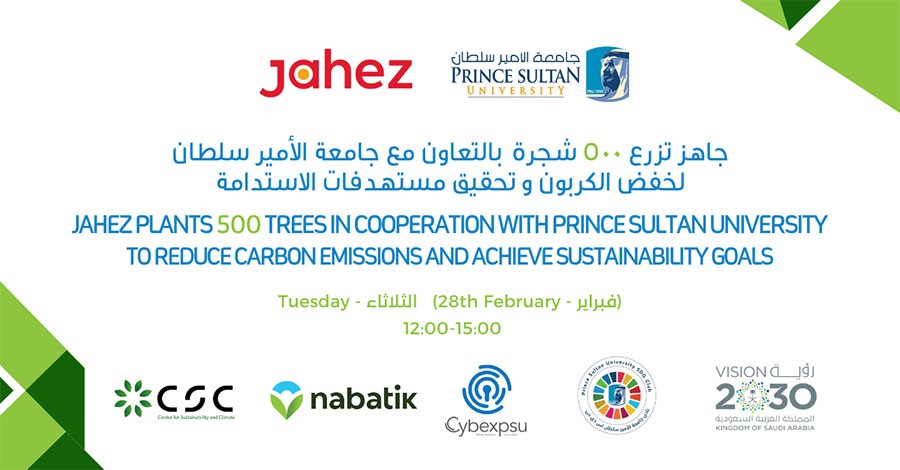
In line with Sustainable Development Goal 7 (SDG 7) and the commitment to advancing a low-carbon economy, Prince Sultan University (PSU) actively supports low-carbon innovation through collaboration and hands-on initiatives with industry leaders. A recent project with Jahez, in which 500 trees were planted, exemplifies PSU’s commitment to reducing carbon emissions and supporting start-ups focused on sustainable practices.
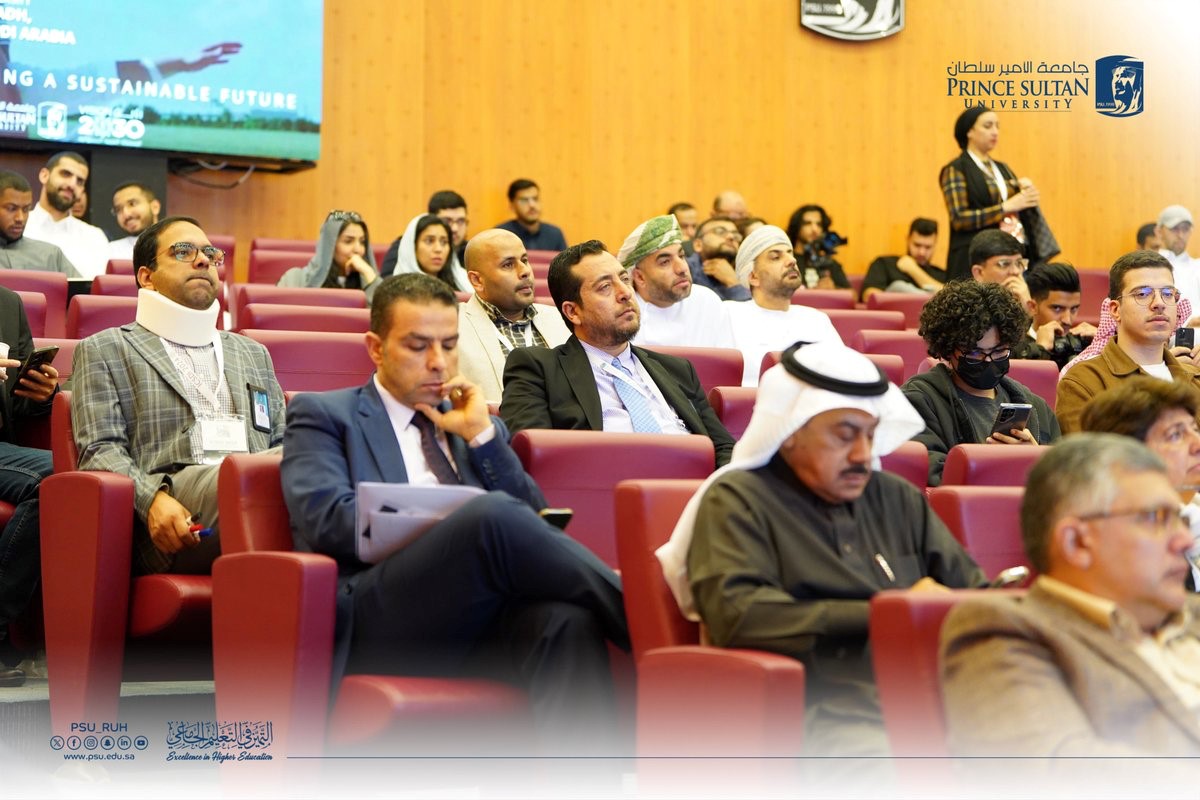
Additionally, Dr. Fahd Al-Sharahi, Vice President of Sustainability at SABIC, emphasized SABIC's role in pioneering carbon neutrality strategies, corporate sustainability, and circular carbon economy initiatives. These joint efforts underscore PSU’s role in fostering a low-carbon economy by aiding innovative projects and start-ups that align with Saudi Arabia's sustainability goals.
Low-carbon energy use
In addressing Sustainable Development Goal 7 (SDG 7) on low-carbon energy use, Prince Sultan University (PSU) reports a total annual energy usage of 15.9 GWh, though currently none of this energy is sourced from low-carbon alternatives. This metric underscores the critical need to transition towards cleaner energy sources to reduce carbon emissions and align with national and global sustainability targets. PSU is actively exploring avenues to incorporate renewable energy sources, improve energy efficiency, and reduce reliance on high-carbon energy. These efforts will support a shift towards sustainable energy use, helping the university meet both SDG 7 and broader environmental objectives.
Recommended Practice for Energy Efficiency improvement
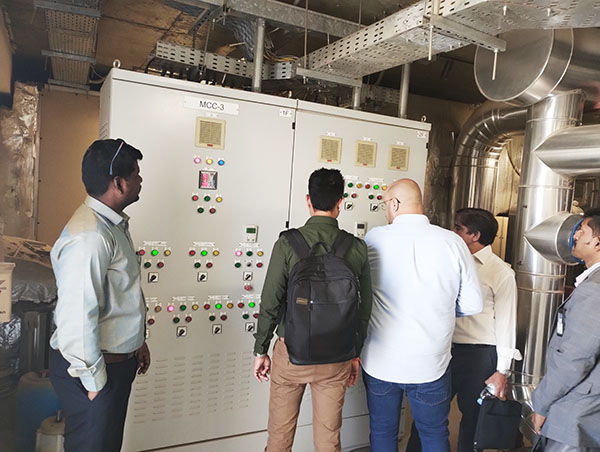
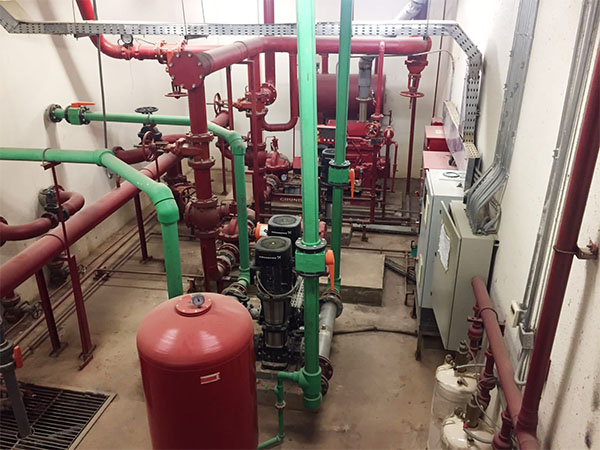
The Energy Efficiency Improvement Report for Building 105 at Prince Sultan University identifies operational inefficiencies in the rooftop chiller plant, underground water pumping systems, and the improper use of Variable Frequency Drives (VFDs). Key findings include suboptimal chiller setpoints, uneven pump load distribution, non-operational VFDs, and excessive pipeline vibrations.
The report outlines recommendations such as resetting temperature setpoints, reactivating VFDs, implementing soft start/stop sequences, and addressing pipeline vibrations through dampers or expansion joints. It also emphasizes the importance of standard operating procedures (SOPs), routine maintenance logs, energy monitoring systems, and staff training. Expected benefits include reduced energy costs, extended equipment life, risk mitigation, and alignment with sustainability goals, particularly SDG 6, 7, 12 and 13. The report suggests replicating these measures across other university buildings to enhance overall energy efficiency.
Read Full


